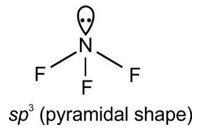4.17. Define electronegativity. How does it differ from electron gain enthalpy?
4.17. Define electronegativity. How does it differ from electron gain enthalpy?
-
1 Answer
-
4.17. Electronegativity: Electronegativity is the tendency of an atom to attract shared pair of electrons towards itself. Electronegativity of any given element is never the same.
It depends on the element it is bonded with in a compound. Electronegativity is a relative quantity and cannot be measured.
Whereas, electron gain enthalpy is the change in enthalpy when an electron is added to a neutral gaseous atom to form an anionic specie.It can have a positive or negative value. Every element has a specific electron gain enthalpy value.
Similar Questions for you
He2 has zero bond order hence it does not exist.
The three fundamental laws of chemistry are - Law of Definite Proportions, Law of Conservation of Mass, and Law of Multiple Proportions.
The three types of chemical bonds are - ionic, metallic and covalent bonds. When the electrons transfer between the atoms, they form the Ionic bonds by producing charged ions that are attracted to each other. When atoms share electrons, covalent bonds are created. When metal atoms share a sea of delocalized electrons, metallic bonds get created.
Taking an Exam? Selecting a College?
Get authentic answers from experts, students and alumni that you won't find anywhere else
Sign Up on ShikshaOn Shiksha, get access to
- 66k Colleges
- 1.2k Exams
- 681k Reviews
- 1800k Answers


